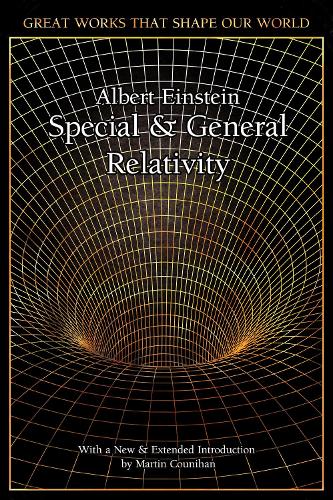
Special and General Relativity
(Hardback, New edition)
Publishing Details
Special and General Relativity
By (Author) Albert Einstein
Introduction by Martin Counihan
Flame Tree Publishing
Flame Tree Publishing
16th September 2019
New edition
United Kingdom
Classifications
General
Non Fiction
Popular science
530.11
Physical Properties
Hardback
240
Width 153mm, Height 234mm, Spine 23mm
Description
Special and General Relativity by Albert Einstein contains his core paper, 'Relativity, The Special & The General Theory. A Popular Exposition', which established his reputation as one of the greatest thinkers of our and perhaps any age. Also included are the four lectures he gave to explain his findings in more detail: 'The Meaning of Relativity'. FLAME TREE's Great Works That Shape Our World is a new series of definitive books drawing on ancient, medieval and modern writing. Created to entertain, inform and enrich the new series brings infinite variety to refresh the mind, presented in beautiful editions for the modern market. Each book features a new, accessible introduction placing the book in context both as part of the new series, and its special contribution to the advancement of human understanding. New Introductions specially written for these editions examine the significance of each work, their impact at time of publication, and their influence today. Created to entertain, inform and enrich the new series brings infinite variety to refresh the mind, presented in beautiful editions for the modern market. Each book features a new, accessible introduction placing the book in context both as part of the new series, and its special contribution to the advancement of human understanding. New Introductions specially written for these editions examine the significance of each work, their impact at time of publication, and their influence today. AUTHOR: Albert Einstein was a German mathematician and physicist who developed the special and general theories of relativity. In 1921, he won the Nobel Prize for physics for his explanation of the photoelectric effect. In the following decade, he immigrated to the U.S. after being targeted by the Nazis. His work also had a major impact on the development of atomic energy. In his later years, Einstein focused on unified field theory. With his passion for inquiry, Einstein is generally considered the most influential physicist of the 20th century.
Author Bio
Albert Einstein was a German mathematician and physicist who developed the special and general theories of relativity. In 1921, he won the Nobel Prize for physics for his explanation of the photoelectric effect. In the following decade, he immigrated to the U.S. after being targeted by the Nazis. His work also had a major impact on the development of atomic energy. In his later years, Einstein focused on unified field theory. With his passion for inquiry, Einstein is generally considered the most influential physicist of the 20th century.
A particle physicist, Martin Counihan (University of Southampton) is responsible for continuing education and public outreach in the sciences. Since then he has provided hundreds of courses, initiating and directing programmes not only in physics but also in environmental science, information technology, and the humanities. He is part of the School of Physics and Astronomy and now on attachment to the Faculty of Engineering, Science and Mathematics, providing the interdisciplinary course Science in History.
